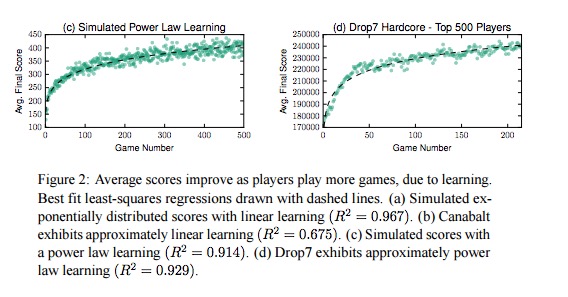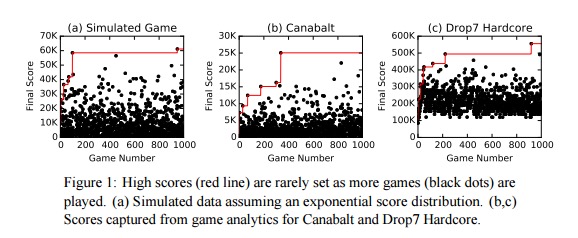A bit counterintuitive, no? But it makes sense.
According to a new research paper, A Statistical Analysis of Player Improvement and Single-Player High Scores, from researchers at NYU Tandon, after the first few plays, people tend to stop improving at games, or at least they improve very, very slowly.
“Using analytical probabilities, simulated game data, and actual game analytics data from two popular mobile games, we show that the probability of reaching a high score decrease rapidly the more one plays, even when players are learning and improving,” researchers Aaron Isaksen and Andy Nealen wrote.
High scores tend to follow extreme value theory, the researchers say. Extreme value theory is a branch of statistical analysis used to predict the likelihood of extreme stuff happening. It’s used most in extreme weather events, financial markets and breaking records in sports. You can see this in something like the record time for the mile run. Although it may have been broken several times in succession after it was officially recorded and timed, it’s been broken only very rarely and very slightly since. The graph of attempts to time would look a lot like the video game graph.
“Much of the player improvement happens either so slowly it does not significantly impact the player’s ability to achieve a high score, or happens mainly in the first few plays of the game,” the researchers write. “After many plays, player improvement is relatively minor and effectively negligible.”
This, they say, presents a problem for games.
If the time it takes players to hit new high scores stretches on longer and longer, they’re likely to get bored of the game and move on to a new one (where they’ll hit a bunch of high scores right at the beginning, natch). So the researchers came up with a couple of solutions:
We present and analyze several other metrics that could be used for motivating players with score-based goals: beating the previous score, beating the previous k scores, number of high scores achieved, placing on a Top m Leaderboard, completing a streak of k consecutively increasing scores, and beating the mean score. We also introduce a new metric called “decaying high score” which is a parameterized, designer-tunable metric that becomes easier to reach the more the player fails to reach it.

Hold your horses from galloping through the fun parade, if you can. Isaksen and Nealen admitted some of those suggestions are not as good as the others and decided on two to focus on: decaying high scores and beating the mean.
Instituting a decaying high score would mean that every so often, the high score gets lower. Say, after 10 rounds of game play, the score decreases by 10 percent. This gives the player a more achievable goal.
Beating the mean would just take all the scores from the games you’ve played and average them out, meaning each game you play, you’d want to do better than average. The more you play and improve (even if improvement is slow) the higher the mean will be, and the more challenging it will be to get above the mean.
We guess. These both seem pretty lame to us. Players live for that high score. There’s something about it being an all-time record that motivates more than a high score decayed over time ever could, we think. And beating a mean? Who is playing games to do better than average. We’re playing to be epic, here.
But we could be wrong. What do you think?

Researchers plot out the progress players make over time on high scores, which follows a curve shape commonly known as “BOFA.” (Courtesy image)
Join the conversation!
Find news, events, jobs and people who share your interests on Technical.ly's open community Slack

